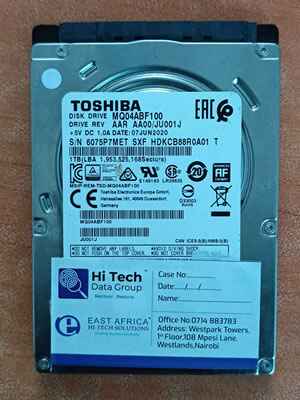Data Recovery Malawi by Experts
Data Recovery Malawi – Hi Tech Data Group is a leading provider of data recovery services in Malawi. With years of experience and a team of highly skilled technicians, we are dedicated to helping individuals and businesses recover their valuable data in the event of a disaster.
If you have experienced data loss and need help recovering your files, don’t hesitate to contact Us. We are among the best data recovery companies in Malawi. Our team is available to assist you with your data recovery needs.

Data Recovery Services in Malawi
- Hard Drive Data Recovery Malawi: We specialize in recovering data from various types of hard drives, including internal and external hard drives, RAID systems, and solid-state drives (SSDs).
- Laptop Data Recovery Malawi: Our technicians are experts in recovering data from damaged or malfunctioning laptops, ensuring that your important files, documents, and photos are safe.
- Server Data Recovery Malawi: When it comes to server data recovery, we understand the critical nature of the situation. Our team works quickly and efficiently to restore your server’s data and minimize downtime.
- RAID Data Recovery Malawi: We have the knowledge and tools to recover data from RAID systems, even in the event of multiple drive failures.
- SSD Data Recovery Malawi: Solid-state drives are becoming increasingly popular due to their faster performance and lower power consumption compared to traditional hard drives. However, SSDs are not immune to data loss. Our technicians are trained to handle SSD recovery, utilizing specialized techniques to retrieve data from damaged or corrupted drives.
- Flash Drive Data Recovery Malawi: Whether you’ve accidentally deleted files from your USB flash drive or it’s physically damaged, we can help you recover your data.
- Memory Card Data Recovery Malawi: Our technicians are skilled in recovering data from various types of memory cards, including SD cards, CF cards, and microSD cards.
Why Choose Hi Tech Data Group?
- Expertise: Our team of technicians has extensive experience in data recovery and is constantly updating their skills to stay ahead of the curve.
- Advanced Technology: We use state-of-the-art equipment and software to ensure the highest success rate in data recovery.
- Secure Facilities: Our clean-room facilities are designed to protect your data and prevent further damage during the recovery process.
- Confidentiality: We understand the importance of data privacy and confidentiality. We take every precaution to ensure that your data remains secure throughout the recovery process.
- Affordable Prices: We offer competitive prices for our data recovery services, ensuring that everyone can afford to protect their valuable data.
Data Recovery Process
Steps Hi Tech Data Group Takes to Recover Data;
- Send or Bring in Device for Assessment
- In-Lab Diagnosis and Evaluation
- Actual Data Recovery
- Logical Recovery
- Physical Recovery
- Data Analysis and Verification
- Data Transfer and Collection
Key Factors Affecting Data Recovery Malawi Success Rates
Data recovery is a complex process influenced by several factors. Understanding these factors can help you assess the likelihood of successful data recovery and guide your actions in the event of data loss. Here are the key factors that affect data recovery success rates:
1. Type of Data Loss
The nature of the data loss significantly impacts recovery success:
- Logical Failures: These include accidental deletions, formatting, or corruption of files. Logical failures generally have higher recovery success rates because the physical storage medium remains intact.
- Physical Failures: Issues such as mechanical damage, electrical failure, or physical trauma to the storage device can complicate recovery efforts. The extent of the damage determines how successful the recovery will be.
2. Condition of the Storage Device
The physical condition of the storage device plays a crucial role in recovery outcomes:
- Age and Wear: Older devices may have more wear and tear, making them more susceptible to failure. Devices that are well-maintained may have a higher chance of successful recovery.
- Type of Storage Media: Different types of storage media (HDDs, SSDs, flash drives, etc.) have varying recovery success rates. For example, SSDs can be more challenging to recover from due to their wear-leveling algorithms.
3. Time Since Data Loss
The time elapsed since the data loss occurred can affect the chances of recovery:
- Immediate Action: The sooner you attempt recovery after data loss, the better the chances of success. Continued use of the device can lead to overwriting of lost data, making recovery more difficult.
- Environmental Factors: Exposure to adverse conditions (e.g., heat, moisture) can further deteriorate the storage device over time, reducing recovery success rates.
4. Professional Expertise
The skills and experience of the data recovery Malawi professionals are critical:
- Technical Knowledge: Technicians with specialized training and experience in data recovery techniques are more likely to successfully retrieve lost data.
- Tools and Technology: Access to advanced data recovery tools and software can significantly enhance recovery success rates. Professionals equipped with the latest technology can handle complex recovery scenarios more effectively.
5. Recovery Methodology
The approach taken to recover data can influence outcomes:
- Non-Invasive Techniques: Using non-invasive methods to recover data, such as software-based recovery for logical failures, often yields better results than invasive techniques that may cause further damage.
- Data Recovery Environment: Performing recovery in a controlled environment, such as a cleanroom for physical repairs, minimizes the risk of contamination and damage during the recovery process.
6. Type of File System
The file system used on the storage device can affect recovery success:
- File System Integrity: File systems that are more robust and have built-in error correction may allow for easier recovery compared to those that are less resilient.
- File System Type: Different file systems (e.g., NTFS, FAT32, ext4) have varying recovery capabilities. Some file systems may retain more metadata, aiding in recovery efforts.
7. User Actions Post-Loss
What you do after data loss can significantly impact recovery success:
- Avoiding Further Use: Continuing to use the device increases the risk of overwriting lost data, which can severely limit recovery options.
- Attempting DIY Recovery: While some users may attempt DIY recovery methods, these can lead to further data loss or damage. It’s often best to consult professionals immediately.
Most Common Data Loss Scenarios in Malawi
Data loss can occur due to various reasons, and it’s important to be aware of the most common scenarios in Malawi to take preventive measures and be prepared for potential data recovery situations. Here are some of the most common data loss scenarios in Malawi:
1. Power Surges and Outages
Malawi experiences frequent power outages and voltage fluctuations, which can cause damage to electronic devices and lead to data loss. Sudden power surges or spikes can corrupt data stored on hard drives, SSDs, and other storage media.
2. Liquid Damage
Spilling liquids on electronic devices is a common occurrence, especially in areas with high humidity or during the rainy season. Liquid damage can short-circuit components and cause permanent damage to storage media, leading to data loss.
3. Physical Damage
Accidents, such as dropping a laptop or external hard drive, can cause physical damage to the storage media, resulting in data loss. Malawi’s roads and transportation infrastructure can be challenging, increasing the risk of physical damage to devices during travel.
4. Malware and Viruses
Malware and viruses can infect computers and corrupt or delete data stored on the device. Malawi’s internet infrastructure is still developing, and some users may not have adequate protection against cyber threats.
5. Human Error
Accidental deletion of files, formatting the wrong drive, or overwriting important data can lead to data loss. Human error is a common cause of data loss, and it can happen to anyone, regardless of their technical expertise.
6. Hardware Failures
Over time, storage media can fail due to wear and tear, manufacturing defects, or age. Hard drives, SSDs, and other storage devices have a limited lifespan and can fail unexpectedly, leading to data loss.
Best Data Recovery Malawi – To mitigate the risk of data loss in Malawi, it’s essential to have a reliable data backup strategy, use surge protectors, and be cautious when handling electronic devices. If you experience data loss, it’s crucial to seek professional help from a reputable data recovery service like Hi Tech Data Group to maximize your chances of recovering your valuable data.
Importance of Data Recovery in Malawi
Data recovery is a critical process in Malawi, where many individuals and businesses rely on digital information for their daily operations. In a country where technological infrastructure is still developing, the risk of data loss due to various factors, such as hardware failures, human errors, or natural disasters, is significant.
Here are some key reasons why data recovery Malawi is important in Malawi:
- Protecting Valuable Information
- Ensuring Business Continuity
- Complying with Regulations
- Preventing Data Breaches
- Enabling Digital Transformation
Contact Us
If you are facing data loss issues, don’t hesitate to reach out to Hi Tech Data Group. Our team is ready to assist you with professional data recovery services in Malawi.
Contact us today to schedule a consultation and let us help you restore your valuable data! By choosing Hi Tech Data Group for your data recovery needs in Malawi, you are ensuring that your data is handled with expertise and care. Our commitment to quality service and customer satisfaction sets us apart as the leading data recovery provider in the region.

